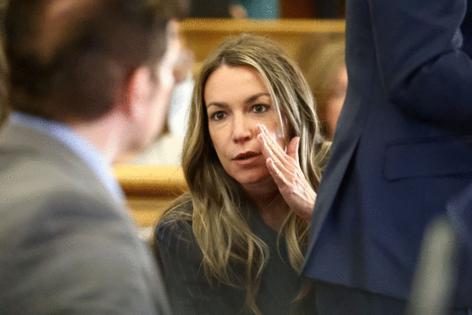Karen Read files double jeopardy petition with Supreme Court
Published in News & Features
BOSTON — As jury selection unfolds in the Karen Read retrial in Dedham her attorneys have taken their efforts to overturn the murder charge all the way to the U.S. Supreme Court.
Read, 45, of Mansfield, is accused of striking John O’Keefe, her boyfriend of two years and a 16-year Boston police officer, with her car and leaving him to die in a major snowstorm on the front lawn of 34 Fairview Road in Canton on Jan. 29, 2022.
She was tried on charges including second-degree murder last summer but that ended in mistrial after the jury sent three notes indicating an impasse. Jury selection for her second trial began on Tuesday.
On the third day of jury selection, 74 new potential jurors were questioned. Attorneys selected three more for the final pool, which over the three days makes for a pool of 10: five men and five women.
Jury selection has been a difficult process, as expected, as the vast majority of jurors have indicated each day that they have at least heard of the Read case, with another majority of those also indicating they had already formed an opinion.
The basis
The attorneys for Read are basing their Supreme Court case on a continuation of the 2012’s Blueford v. Arkansas, which in many ways resembles the Read team’s own arguments on why Read should be cleared of the murder charge in her retrial.
“This case is an ideal vehicle to resolve an issue of fundamental constitutional importance argued to the Court but not decided in Blueford v. Arkansas,” the petition document states.
In Blueford, a defendant was charged with murder in Arkansas. During deliberations, the jury indicated to the judge that it was ready to acquit the defendant on charges of capital murder and first-degree murder, but was not sure on manslaughter and hadn’t voted on a fourth charge. The judge ordered the jury back to deliberations but the jury could still not return a full verdict. The judge declared a mistrial.
Both the Supreme Court of Arkansas and, subsequently, the U.S. Supreme Court found that the trial judge’s mistrial decision was correct and the mid-deliberation notice of not guilty on the two charges did not constitute a real verdict, thus the defendant could be retried on all charges.
“The Double Jeopardy Clause protects against being tried twice for the same offense. The Clause does not, however, bar a second trial if the first ended in a mistrial,” Supreme Court Chief Justice John Roberts wrote in summary of the case. “All agree that the defendant may be retried on charges of manslaughter and negligent homicide. The question is whether he may also be retried on charges of capital and first-degree murder.”
How it relates
Read’s attorneys within a week of last summer’s mistrial declared that multiple jurors spoke out to say that a similar situation had occurred during deliberations in Read’s case.
The defense team says that jurors told them that the jury was unanimous in “not guilty” votes for the murder and leaving the scene charges and was only hung on the manslaughter charge. The jurors said they didn’t know they could return a partial verdict.
This revelation, Read’s team argues, means that Read should be considered not guilty for murder and that to retry her on that charge and the leaving the scene charges would be a violation of her Double Jeopardy rights.
The argument has not been successful so far.
The argument failed with trial Judge Beverly Cannone, who will also preside over the retrial; the Supreme Judicial Court, which upheld Cannone’s ruling; and U.S. District Court Judge F. Dennis Saylor IV, who in a nuanced opinion concluded that the argument did not rise to the level of the federal courts interjecting into state courts.
The defense then appealed to the federal First Circuit Court of Appeals, which ruled last week to uphold Saylor’s ruling.
The petition
Now comes the petition to the Supreme Court, in which Read’s attorneys say the court can resolve issues left over in Blueford.
“The jury’s not guilty verdicts were not announced because the trial court, believing but not confirming that the impasse reported in a series of three juror notes applied to all, rather than only some, counts, never inquired regarding the scope of the deadlock and the jurors failed to volunteer to the trial court that their impasse was limited to one of the three counts rather than all,” the petition filed Tuesday states.
The petition argues that the First Circuit’s conclusions in the Read appeal “runs contrary to this Court’s repeated emphasis, over more than a century, that what constitutes an acquittal for purposes of the Double Jeopardy Clause is controlled by substance, not form.”
“In sum,” the petition states later, “the defense learned post-trial that the jury reached a verdict that was not announced. It was at least entitled to the opportunity to substantiate that fact in order to ensure Read is not unconstitutionally forced to stand trial for criminal offenses, including murder, of which she has already been acquitted.
“Such inquiry in no way intrudes on the deliberative process of the jury,” the petition continues. “Such an inquiry instead honors the jury service which the trial court described as ‘extraordinary’ rather than rendering irrelevant the efforts of at least four jurors to disclose that there was not an impasse on all three counts, as contrasted to only one count.”
_____
©2025 MediaNews Group, Inc. Visit at bostonherald.com. Distributed by Tribune Content Agency, LLC.







Comments